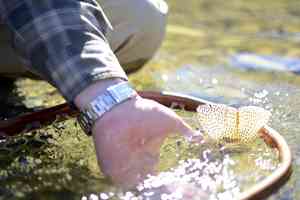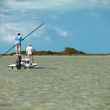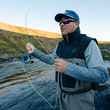STORRS, CT—A University of Connecticut Professor of Logic, Leann Jackson, is believed to be the first fly angler to fish the famed Delaware River yesterday when she should have been there today. An avid angler for much of her life, Ms. Jackson regularly makes the four-hour drive to upper New York to fish the west, east, and main branches of one of the nation’s greatest trout rivers.
“Like most anglers, I’ve grown accustomed to having a so-so day on that river, only to have another angler say, `Let me tell you, sister, you should have been here yesterday.' But a friend defied all accepted beliefs about how logic applies to fishing when he called to tell me I should have been there today, not yesterday as I had been.”
Scholars in the field of logic study how we reach conclusions from deductive and ampliative arguments. “A deductive argument is one that is correct when its premises are correct,” Professor Jackson explained. “If we start with the premises all men are mortal and Socrates is a man, then we deductively conclude that Socrates is mortal, you see. Non-deductive reasoning is sometimes called ampliative. For this, we might start with the premise every swan we’ve seen has been white and conclude all swans are white, which is logically flawed from a deductive perspective.”
Professor Jackson went on to explain that for years, logicians have believed the deductive conclusion for nearly every unfavorable fishing situation is that you should have been there yesterday. The suggestion that you should be there tomorrow is believed to be a weaker conclusion of the ampliative type. But Ms. Jackson’s experience on the Delaware River has sent shock waves through the logic and angling communities.
“What if,” Professor Jackson asked, “despite all existing data, it is possible to be on a river a day early, and the deductive conclusion from the premise of a bad day’s fishing is that you should be there tomorrow? This time-space angling paradox just might change everything. The only constant seems to be that, most of the time, you should not be there when you are.”
More Like This
Dr. Erin Sanrestich, Professor Jackson's colleague from the School of Medicine’s Department of Psychiatry, believes this finding will significantly impact human health and well-being. "In the past, anglers have looked at a slow day only through the lens of missed opportunity. With this finding, we might replace the negative thoughts of opportunity lost with the positive thoughts of opportunity found. A small change like that can immeasurably affect mental health. Imagine if everyone could rediscover the feeling of believing in Santa Claus. I believe we are talking about that kind of change."
Professor Jackson’s experience has already begun affecting destination fishing vacations, with outfitters offering open-ended reservations for a significant up-charge. “When the fishing community realizes science tells us it’s just as likely you should be there tomorrow as it is that you should have been there yesterday, I believe we’ll see a dramatic increase in the number of high-end customers booking extra days just to be safe,” said Ian Blockridge, media representative for the Fly Fishers International Guides and Outfitters Association.
![Woo baby, today was one to remember on the East [pictured above], West, and mainstem (photo: Andrew Savidge). fly fisherman hooked up on east branch of delaware river](https://www.hatchmag.com/sites/default/files/styles/preload/public/field/image/leo---001.jpg?itok=UomTGuDr×tamp=1706735165)





























Comments
DNM replied on Permalink
Nice.
Pages